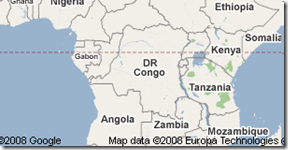# 2615

The average life expectancy for the 66 million people who live in the Democratic Republic of the Congo is but a scant 54 years.
AIDS, and a host of other diseases including malaria, schistosomiasis, bacterial and protozoal diarrhea, hepatitis A, and typhoid fever- combined with minimal (sometimes non-existent) public health services - make life there very hard indeed.
The Democratic Republic of the Congo is also the unhappy recipient of occasional outbreaks of Ebola, such as the one reported late last month.
Electron micrograph of Ebola virus. - CDC
The CDC maintains an Ebola Q&A page, with information on the disease HERE.
This is the latest update from the WHO (World Health Organization).
Ebola haemorrhagic fever in the Democratic Republic of the Congo - update
2 January 2009 -- The Ministry of Health of the Democratic Republic of the Congo (DRC) is continuing to respond to the ongoing outbreak of Ebola haemorrhagic fever in the Mweka health zone, Province of Kasai Occidental with the support of a wide range of international partners.
As of 31st December there has been a total of 3 laboratory-confirmed cases of Ebola haemorrhagic fever. WHO is aware of 36 additional suspected cases including 12 deaths associated with this outbreak. A further 184 contacts have been identified and are being followed up.
Laboratory analysis was undertaken at the the Institut National de Recherches Biomédicales (INRB) in Kinshasa , DRC , the Centre International de Recherches Médicales de Franceville (CIRMF), Gabon, and the National Institute for Communicable Diseases (NICD), South Africa.
The WHO Country Office, Regional Office and Headquarters are supporting the MoH in Kinshasa, in Kananga and in the field at the location of the outbreak. WHO has deployed five vehicles to the field and has sent outbreak response equipment and medical supplies. The local health authorities in the affected area are working closely with social mobilization experts to develop key information messages for the local communities.
The international response to the outbreak includes partners from Caritas (Belgium), the Congolese Red Cross (DRC) , Médecins Sans Frontières (Belgium), UNICEF, the United Nations Organization Mission in the Democratic Republic of the Congo (MONUC), and the World Food Programme (WFP) .
